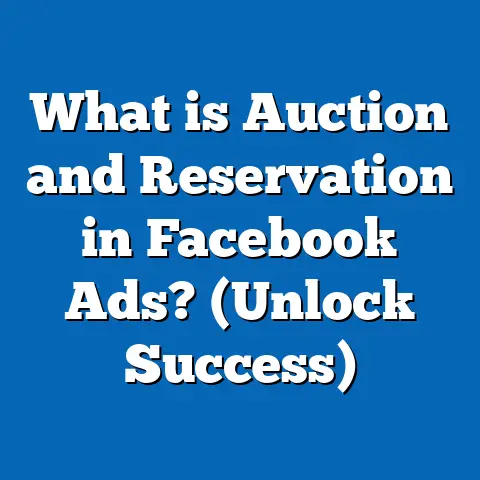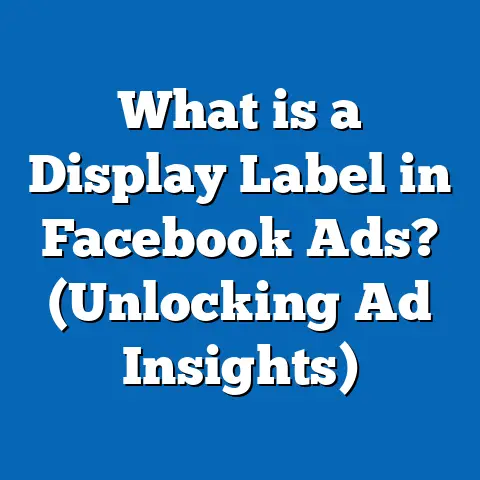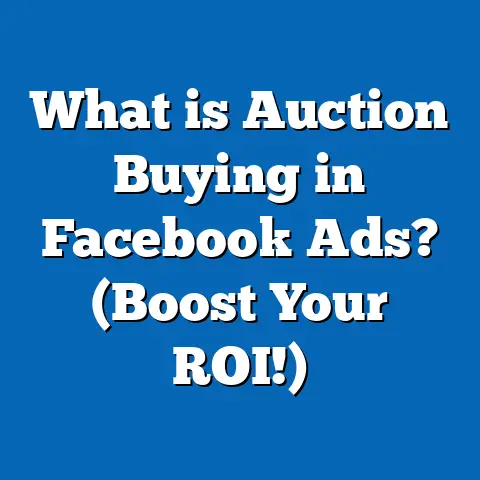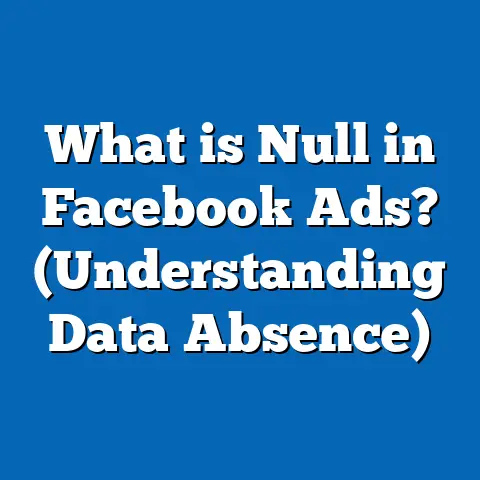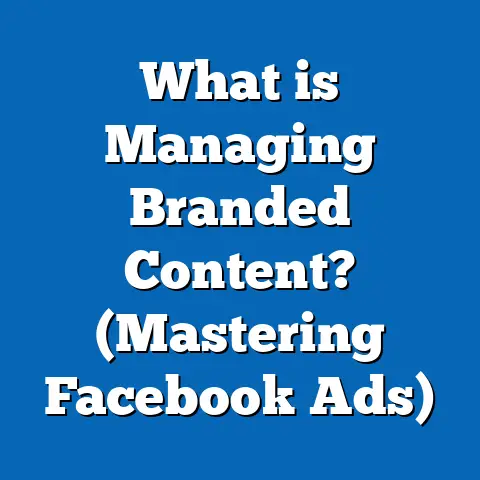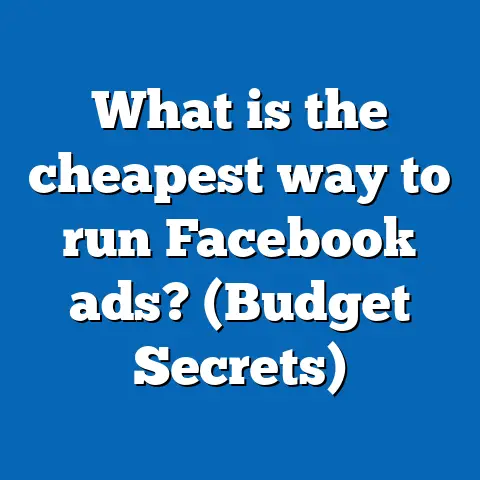What is Reservation in Facebook Ads? (Unlocking Ad Potential)
Introduction: The Power of Facebook Ads and the Role of Reservation
Imagine launching a campaign on Facebook, a platform that connects over 3.9 billion active users worldwide every month. The sheer scale is staggering—nearly half the world’s population is reachable with your message through Facebook and its family of apps, including Instagram, Messenger, and WhatsApp. For marketers and business owners, this represents an unparalleled opportunity to engage audiences with precision and scale.
Yet, with this massive reach comes fierce competition. Every advertiser is bidding to capture user attention within the limited and highly valuable space of the social feed. Traditional auction-based advertising on Facebook means you are competing in real-time with thousands of others, which can lead to fluctuating costs and unpredictable delivery.
Now envision a scenario where you could bypass this uncertainty. Where you secure your ad space ahead of time, guaranteeing your ads will be shown to your exact audience at a fixed price. This is precisely what Reservation in Facebook Ads offers—an option to guarantee premium ad placements through direct agreements with Facebook.
Reservation changes the game by giving advertisers control over placement, timing, and cost. It enables brands to plan campaigns with confidence, ensuring their message is delivered exactly as intended without the risk of auction volatility. Whether you’re launching a new product, promoting an event, or building brand awareness on a large scale, understanding and leveraging Reservation can unlock significant benefits.
This guide will provide you with an in-depth understanding of Facebook Ads Reservation—from fundamentals to advanced strategies. You’ll gain insights into how it works, when to use it, its advantages and limitations, case studies showcasing success, comparisons with other platforms, technical workings simplified, and future industry trends. By the end, you will be equipped to confidently decide if Reservation is right for your marketing goals and how to execute campaigns that maximize your ad potential.
What is Reservation in Facebook Ads?
Defining Reservation: Beyond Traditional Auction Ads
Facebook Ads operate primarily on an auction system where advertisers bid for ad placements. With every impression opportunity—whether a scroll through the News Feed or an Instagram story—Facebook runs an instantaneous auction deciding which ad wins based on bid amount, relevance score, and user experience metrics.
Reservation ads, however, work differently. They are pre-negotiated deals between advertisers and Facebook where specific ad inventory is booked in advance. This guarantees delivery of impressions at fixed costs during agreed-upon time frames.
In essence:
- Auction Ads: Real-time bidding determines who shows their ads.
- Reservation Ads: Inventory is reserved ahead of time for guaranteed delivery.
Reservation ads resemble traditional media buying where advertisers book TV or print ad spots ahead of broadcast dates.
Key Features of Reservation Ads
- Guaranteed Impressions: Facebook commits to delivering a predetermined number of impressions.
- Fixed Pricing: The cost per thousand impressions (CPM) or other negotiated pricing does not fluctuate.
- Premium Inventory Access: Reserved placements often include high-impact spots on Facebook’s platforms.
- Direct Negotiation: Deals are made through Facebook sales representatives or partners rather than self-serve platforms.
- Campaign Scheduling: Advertisers can select exact flight dates for their campaigns.
Why Reservation Matters in Today’s Digital Advertising Landscape
Overcoming Auction Volatility
Auction-based advertising has strengths—flexibility and optimization—but it also introduces unpredictability. Bidding wars can drive CPMs up during peak times or competitive categories. This makes budgeting difficult, especially for large-scale branding campaigns requiring consistent reach.
For example:
- Facebook’s average CPM can vary by as much as 30%-50% during seasonal spikes like Black Friday or back-to-school sales.
- Without guaranteed spots, advertisers risk under-delivery or overspending chasing impressions.
Reservation eliminates these variables by locking in costs and delivery upfront.
Ensuring Brand Safety and Contextual Control
With reservation deals, advertisers can specify preferred placements that align with their brand values and avoid risky content environments.
According to a 2023 survey by TrustRadius:
- 68% of brand marketers cited brand safety as a primary concern when buying social ads.
- Reservation buying reduces exposure to uncertain inventory compared to auction where bids may place ads next to controversial content.
Increasing Campaign Impact Through Premium Placements
Reserved inventory usually includes prime placements such as:
- Facebook News Feed — the most viewed space.
- Instagram Stories — high engagement channels.
- Audience Network premium apps.
These placements drive better engagement rates and brand recall due to their visibility and user engagement patterns.
The Evolution of Facebook Ad Buying: From Auction Dominance to Reservation Options
Historical Context of Facebook Ad Buying
Initially, Facebook advertising was a straightforward auction marketplace where advertisers competed for limited space. Over time, as demand grew and platform capabilities advanced, Facebook introduced more sophisticated buying options addressing different advertiser needs:
- Auction Buying (Default): Most common; suited for performance-driven campaigns focused on conversions.
- Reach and Frequency Buying: Launched around 2016; allows advertisers to predictably reach audiences with controlled frequency over set time frames.
- Reservation Buying: A specialized option for premium advertisers needing guaranteed impressions on premium placements.
Market Share and Trends
A study by eMarketer in late 2023 showed:
- Auction ads accounted for approximately 85% of Facebook’s ad revenue globally.
- Reach & Frequency campaigns made up about 10%.
- Reservation ads represented roughly 5%, but their share is growing among large brands investing heavily in brand awareness.
Why More Advertisers Are Exploring Reservation
Increased competition in auctions has led to rising CPMs:
- In Q1 2024, CPMs for auction ads rose by ~12% year-over-year across industries.
- This inflation drives advertisers toward reservations that offer price stability.
Additionally, brands are placing greater emphasis on long-term brand equity rather than immediate clicks alone, favoring reservation’s predictability.
How Reservation Works: A Step-by-Step Guide
Step 1: Define Campaign Objectives Clearly
Reservation is ideally suited for campaigns focused on:
- Brand awareness: Maximizing reach within target segments.
- Product launches: Ensuring mass exposure during key periods.
- Event promotions: Driving attendance through guaranteed visibility.
- Seasonal campaigns: Holiday sales or special offers requiring precise timing.
Before approaching Facebook sales teams, align your marketing goals with these use cases.
Step 2: Engage with Facebook Sales Representatives or Authorized Partners
Unlike auction ads available through self-service tools like Facebook Ads Manager:
- Reservation buys require direct negotiation with Facebook’s sales team.
- This process involves discussing your campaign goals, target audience demographics, inventory options, budget constraints, and timing.
Authorized agency partners can also facilitate these deals and assist in planning.
Step 3: Inventory Selection and Targeting
During negotiation:
- Specify which platforms (Facebook feed, Instagram Stories, Messenger) and placements you want reserved.
- Define audience targeting parameters (age, location, interests).
- Agree on frequency caps — limits on how many times a user will see your ad to avoid saturation.
Step 4: Pricing Agreement
Pricing models often include:
- Fixed CPM: Cost per thousand impressions agreed upfront.
- Flat Fee: For some premium sponsorships or event-related placements.
Prices depend on inventory demand and audience exclusivity.
Step 5: Creative Asset Submission & Campaign Setup
Facebook typically requires creatives well before campaign launch for review and approval:
- High-resolution images/videos optimized for specified placements.
- Ad copy aligned with brand guidelines.
Once approved, campaigns are scheduled with reserved inventory guaranteed over flight dates.
Step 6: Campaign Monitoring & Reporting
Throughout the campaign:
- Facebook provides detailed reports showing impression delivery progress against guarantees.
- Engagement metrics like clicks, video views, shares are tracked.
- Audience demographic breakdowns help optimize future reservation buys.
The Advantages of Using Reservation Ads on Facebook
Predictable Budgeting and Delivery
Reservation removes the guesswork from campaign budgeting by locking in costs and impressions beforehand. This predictability aids financial planning across multi-channel marketing budgets.
Access to Premium Inventory Not Always Available in Auctions
Certain high-impact placements—especially those tied to Facebook’s flagship News Feed or Instagram Stories—are often allocated preferentially to reservation buys. This exclusivity ensures maximum visibility for your ads.
Enhanced Brand Safety Controls
Reservation deals allow:
- Pre-selection of safe placements avoiding controversial or inappropriate content.
- Reduced risk of ad placement next to content harmful to brand reputation.
Improved Performance Metrics Backed by Data
Research by Nielsen Catalina Solutions found:
- Brands using reservation buys saw a 15%-20% uplift in brand recall compared to auction-only campaigns.
- Click-through rates improved by 10%-15% due to consistent premium placement delivery.
A case study from a global consumer electronics brand showed a 25% increase in ad recall when integrating reservation buys into their campaign mix versus auction alone.
Challenges and Limitations of Reservation Ads
Higher Minimum Spend Thresholds
Facebook typically requires minimum budgets (often $50k+ per campaign) for reservation deals due to guaranteed inventory commitments. This can exclude small businesses or startups with limited budgets.
Less Flexibility After Booking
Once reserved inventory is secured:
- Changes in targeting or creative assets may be restricted.
- Campaign dates are fixed; last-minute adjustments are difficult compared to auction ads which offer real-time modifications.
Longer Lead Times Required
Negotiating reservation buys requires weeks to finalize contracts and prepare creatives. This makes it less suitable for quick-react campaigns or real-time marketing efforts.
When Should Businesses Use Reservation Ads?
Ideal Scenarios for Reservation Buy Use
- Launching New Products: Guarantee mass visibility during crucial launch windows without worrying about auction competition.
- Driving Event Attendance: Reserve top spots leading up to events (e.g., conferences, sales events).
- Building Brand Awareness at Scale: Reach millions repeatedly with frequency controls ensuring optimal message exposure.
- Seasonal Promotions: Holidays or flash sales where timing and reach certainty are critical.
- High-Stakes Campaigns: When brand reputation demands premium placements with strong safety controls.
Complementary Use With Auction Campaigns
Many sophisticated advertisers combine reservation buys with auction campaigns:
- Use reservation for broad reach & awareness phases.
- Run auction ads simultaneously focused on retargeting or conversion optimization.
This hybrid approach balances guaranteed exposure with budget efficiency and responsiveness.
Deep Dive Case Studies: Reservation Success Stories
Case Study 1: Global Fashion Brand – “Launch with Impact”
Objective: Launch new autumn collection during Fashion Week across Europe & North America.
Strategy:
- Reserved Instagram Stories placements across key markets for two weeks.
- Targeted women aged 18–35 interested in fashion & luxury brands.
- Frequency cap set at 3 views per user per day.
Results:
- Delivered 30 million guaranteed impressions.
- Engagement rate increased by 18% vs. prior auction-only campaigns.
- Online sales uplifted by 12% during campaign window.
This demonstrated the power of guaranteed placement for highly visual storytelling formats like Stories.
Case Study 2: Automotive Manufacturer – “Electric Vehicle Launch”
Objective: Promote new electric vehicle model focusing on awareness & purchase intent.
Strategy:
- Reservation buy on Facebook News Feed with fixed CPM pricing over one month.
- Targeted eco-conscious consumers aged 25–55 in metropolitan areas.
Results:
- Consistent daily reach averaging 5 million users achieved without budget spikes.
- Brand lift survey showed +22% increase in purchase intent post-campaign.
- Cost volatility reduced by nearly 40% compared to previous auction bids during similar periods.
This case highlights how reservation stabilizes costs while maintaining scale and impact.
Comparing Facebook Reservation with Other Platforms’ Reservation Models
| Feature | Facebook Reservation | Google Ads Reservation | LinkedIn Reserved Ads |
|---|---|---|---|
| Guaranteed Inventory | Yes | Yes | Yes |
| Minimum Spend | Moderate ($50k+ typical) | High | High |
| Platform Reach | ~3.9 billion users worldwide | Billions via Search & Display | ~900 million professionals |
| Best Use Case | Brand awareness & launch campaigns | Awareness & video campaigns | B2B targeting & branding |
| Flexibility Post-booking | Limited | Limited | Limited |
| Integration with Programmatic | Limited | Some programmatic options | Limited |
Key Takeaways from Comparison
Facebook’s strength lies in its unparalleled social audience data combined with premium social media placements. Google dominates search intent-based advertising but offers reserved YouTube inventory for branding. LinkedIn targets professional audiences best suited for B2B brands but requires higher budgets.
Technical Concepts Simplified: How Does Facebook Deliver Reserved Ads?
Delivery Algorithms Ensuring Guaranteed Impressions
Facebook’s ad delivery system prioritizes reserved inventory first before filling remaining impressions via auctions. The system schedules your reserved ads evenly over the campaign duration to meet guaranteed impression counts without overshooting daily caps.
Advanced machine learning models optimize:
- Audience segmentation accuracy.
- Frequency management preventing overexposure.
- Placement prioritization based on reserved inventory slots.
Frequency Capping Explained Simply
Frequency capping limits how many times an individual user sees your ad within a set period. This avoids annoying users with repetitive ads which can lead to negative brand perceptions or ad fatigue.
For example:
If your frequency cap is set at 3 per week, each user will see your ad no more than three times weekly regardless of how many times they visit Facebook or Instagram.
Advanced Strategies for Maximizing Reservation Ad Success
Combine Rich Storytelling With Premium Placements
Use dynamic formats like video stories or carousel ads optimized for mobile to fully utilize prime Instagram Stories or Facebook feed spots obtained via reservation deals.
Creative tips:
- Keep videos under 15 seconds for better completion rates.
- Use clear calls-to-action aligned with campaign goals.
Leverage Custom Audience Segmentation
Work with your Facebook sales rep to use custom data segments alongside reservation buys:
- Retarget website visitors or app users within reserved inventory.
- Layer demographic filters for highly relevant reach while maintaining scale.
Monitor Performance Continuously With Real-Time Dashboards
Though delivery is guaranteed, tracking engagement metrics (CTR, video views) helps assess creative effectiveness. Request weekly performance reviews from your account manager to optimize future buys.
Tips for Successfully Planning Your First Reservation Campaign
- Start Early: Initiate conversations at least 6 weeks ahead of launch date due to negotiation and creative review times.
- Do Your Homework: Analyze historical auction performance data to estimate ideal budget ranges for reservation deals.
- Align Creative Assets With Placement Specs: Each placement has unique dimension requirements; design accordingly.
- Set Clear KPIs: Define success metrics relevant to brand awareness like reach frequency balance or brand lift scores.
- Keep Communication Open: Maintain regular contact with your Facebook rep throughout campaign duration for adjustments or insights.
Future Trends Shaping Facebook Ads Reservation
AI-Powered Automated Negotiation Tools
Facebook is developing AI systems that will automate parts of the reservation buying process—matching advertiser goals with available inventory dynamically—reducing lead times and minimum spend barriers.
More Flexible Hybrid Models Combining Auction + Reservation Benefits
Emerging products promise:
- Smaller reserved blocks embedded within auction buys.
- Real-time adjustments within reserved campaigns based on performance signals.
Enhanced Measurement Capabilities Focused on ROI Attribution
Next-gen analytics tools will provide granular insights linking reserved impressions directly to offline sales lifts or long-term brand equity improvements using AI-driven attribution models.
Summary and Key Takeaways
Reservation in Facebook Ads offers marketers:
- Guaranteed premium ad placements at fixed prices removing auction unpredictability.
- Predictable budgeting supporting long-term planning and multi-channel integration.
- Access to high-impact inventory driving better engagement and brand recall.
- Brand safety benefits reducing risks associated with open auctions.
Ideal for product launches, event promotion, seasonal campaigns, and sustained brand-building efforts requiring scale and control.
While requiring higher budgets and longer lead times than auctions, combining reservation buys with auction campaigns creates a powerful marketing mix balancing predictability with flexibility.
Staying informed about evolving features like AI automation and hybrid models will keep your Facebook advertising strategy competitive in the years ahead.
Next Steps for Marketers and Business Owners
- Review your current social advertising spend allocation between auction vs non-auction strategies.
- Engage your Facebook account manager or authorized partner agency to explore reservation opportunities fitting your business goals.
- Develop premium creative assets tailored for reserved placements emphasizing visual storytelling and concise messaging.
- Plan future campaign calendars allowing sufficient lead time for reservation deal negotiations and approvals.
- Monitor campaign performance using provided tools; adjust creative or targeting strategies iteratively based on insights gained.
Mastering Facebook Ads Reservation opens doors to more predictable outcomes and stronger brand impact—key ingredients for sustainable business growth in the digital age.
If you want me to include additional sections such as detailed FAQ about reservation ads or specific walk-through tutorials on negotiating deals with Facebook sales teams, just let me know!

